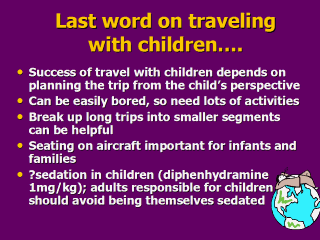| front |1 |2 |3 |4 |5 |6 |7 |8 |9 |10 |11 |12 |13 |14 |15 |16 |17 |18 |19 |20 |21 |22 |23 |24 |review |
 |
There are several
things that parents or guardians can be advised to do or take that may make
a journey less stressful. Advice could include taking favourite foods and
snacks, but avoid foods that children may choke on, such as peanuts, as well
as taking familiar toys or entertaining and new toys, and consider wrapping
old and new presents and let the child open them one at a time as the
child's behaviour dictates, plan the trip so that the schedule is not too
hectic and there is time for play, and ensure adequate stop-overs if going
on long-haul flights. Children usually adapt well to change, but they will
need attention from their parents or guardians. Some parents are tempted to use sedatives for their children. This should generally be discouraged. The effect of antihistamines is unpredictable. For younger children, taking a favourite blanket or pillow may assist sleep en route. If the child is sedated, it is important that the responsible adults avoid being sedated themselves. Airlines often have special meal options for children and it is worth advising the airlines well ahead of travel to request special children's meals. |